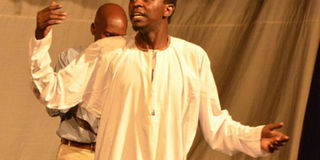Poetry tells Kagayi’s tale

Kagayi performed his poetry at the launch of his book in June. PHOTO BY ALEX ESAGALA
Indeed Kagayi chose to break away from the system and pursue something he was passionate about. This fruit has paid off, as Sooo Many stories published his fist collection “The Headline That Morning and Other Poems”
Why leave Law for literature?
I was already using my poetry/literature to change my society. It would have been irresponsible of me to do otherwise. My conscience could not take it. Neither could my impulses.
Shortly after University, before LDC entry exam, I opted to do poetry-related things instead of practicing law. And the things we accomplished that time were eye-opening and fulfilling. Eventually sticking with poetry was a matter of duty, not choice.
Are you happy with the place you are at now?
One of my favourite poems is Robert Frost’s ‘The Road Not Taken.’ The last quartet (four lines) of the poem are “I shall be telling this with a sigh/Somewhere ages and ages hence:/ Two roads diverged in a wood, and I-/ I took the one less travelled by,/ And that has made all the difference.” What matters to me is not how I feel, but what difference my decision has made in my society, and how the people I have reached out to feel about my impact.
For your first publication, why marriage between music and poetry?
Music and poetry have always been married. It was the generation of text poets (of the educated class) whose popularity and auditory treatment of their own poetry created room for the contemporary. Some of the best poets Uganda has offered are kadongo Kamu artistes. Also, sound usually mellows well with the imagination of feeling, mood and metaphor. Poesy and prosody merged in terms audiences would appreciate them in a different but more accessible way.
You have a multitude of pieces, why the Headline That Morning?
‘The Headline that Morning’ is a metaphor futuristic in nature. It lends itself to relevance as long as public news is in circulation. Actually, my choice had been ‘Tell God I Want to Die’, and my publisher’s was ‘My Country is a Badly Taken Selfie.’ But when we discussed the options we figured our current choice was more relatable to without biasing the reader. So we chose that.
Is the publication- you stepping from being just a founder of poetry platforms to claiming your own space?
I come from a generation of poets who believe we had to create our own spaces of expression beyond the fabric of the page. It became imperative to interpret ourselves according to our audiences. But we had to grow audiences who would understand us as poets, without necessarily being published.
We also edited each other’s works. But the question ‘where can we find your works?’ was always left unanswered. This opportunity of being published comes in handy. But it doesn’t mean I am now ‘claiming’ my own space. I hope I’m just augmenting it.
What are your expectations after this debut?
Ultimately the conversation about poetry (and creative writing) will change. Not because of my book and CD but because now we have a local publisher whose only interest is publishing Ugandan creative writing. That is the most important. Someone will definitely come along and better what is here today. I just hope it happens sooner.
Background
Peter Kakayi hails from Busoga. He is a lawyer by training from Makerere University. He has taught poetry at both Nabisunsa girls and Buddo SSS. He has served as the Anglophone Coordinator of Writivism, president of the Lantern Meet of Poets and founder of Rhymers Poetry Club. He is also the founder and Curator of the regular poetry platform, ‘The poetry shrine,’ at the National Theatre




